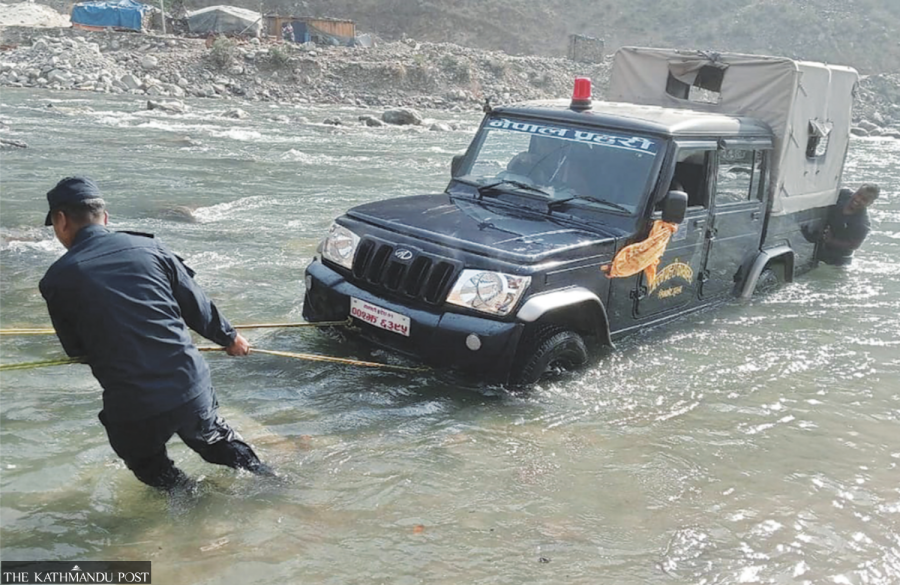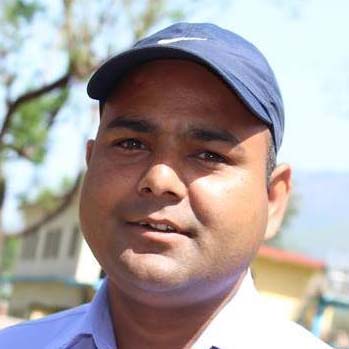Money
People in northwestern edge of Nepal wait for vital bridge
Though a road track links Simkot, the district headquarters of Humla, no bridge over the Karnali river means continued hardship for hundreds of people.
Krishna Prasad Gautam
On May 28, presenting the financial plan for the upcoming fiscal year, Finance Minister Barsha Man Pun said all the 77 districts of the country are now connected by the national road network.
But the ground reality is different.
Without a bridge over the Karnali river at Chuwa Khola of Kharpunath rural municipality, Simkot, the district headquarters of Humla, remains to be connected to the national road network.
Villagers in the northwestern corner of Nepal bordering Tibet in China where the Humla Karnali crosses face hardships in the absence of one bridge.
Though the track was opened to Simkot in mid-April, the construction of the bridge has yet to be completed. As a result, a 12 km section still needs to be completed to connect the district headquarters.
Now, vehicles carrying goods along the Karnali Corridor can only reach Kharpu. From there, the goods have to be transported by helicopters and carried over the river using cables, resulting in additional costs. This method, however, is possible only when the water level is low.
Due to the lack of a bridge, around ten vehicles bought for government offices and passenger service via Surkhet were taken across the river using ropes and a bulldozer. The cars are now operating on the Simkot side.
In 2007-08, the government announced in the annual budget that it would connect Simkot to the national road network. However, even after a decade and a half, Simkot is not connected to the national road network.
In September 2021, the joint venture of Swachchhanda, Mount, and Pumori was awarded the Rs110 million contract for the bridge. The construction companies were issued Rs11 million in advance, and the project completion deadline was fixed in March this year.
However, the company did not start the construction work for a long time, and around a year ago, it was necessary to change the design.
“The joint venture company was responsible for constructing a 55-metre-long motorable truss bridge. But when the contractor started to dig the foundation, a hot water spring was found,” said Bel Bahadur Nepali, chief of the Simikot-Hilsa Road Construction Project.
“The assessment showed that the bridge will not be durable if it is constructed on the existing design. So, we made the new design, which got approved two weeks ago. We will start the bridge construction work in July.”
Nepali said that with the change in design, the contractor has been given a new deadline to complete the project: August 2025.
Binod Kumar Pokharel, chief district officer, said the locals have demanded a Bailey or portable bridge as it may take time to complete the project. “Due to the lack of a bridge, the travellers are facing hassles. The passenger and goods transport charges too are high.”
Pokharel said the river's flow is high throughout the year, so vehicles must be towed across the river with the help of an earthmover to Simkot. “To solve the problem, the locals have demanded a Bailey bridge. We are assessing the need.”
Until last year, vehicles were operated from Khulalu of Kalikot towards Mugu-Bajura-Sillisalla of Humla. Nepali said that the 39 km road track was opened this year.
This year, a 39-kilometre stretch was added. The project opened 8 km of the total track, and the Nepal Army did the work on the remaining 9 km section.
The road from Khulalu of Kalikot to the Chinese border is 268 km long. Of this, 95 km south of Simkot is served by transportation.
However, as the vehicle flow is breached by the lack of a bridge, passengers from Simkot to Khapunath rural municipality must change the vehicle by crossing suspension bridges on foot.
Dan Bahadur Shahi, a senior citizen, said since there is no bridge, vehicles are charging higher fares.
Jeeps run on the 12km Simkot-Kharpu stretch. The vehicle operators charge Rs700 to Rs1,000 per person as fare for a special arrangement called “reserve”. In similar fashion, the jeep operated from Kharpu via Sillisalli to Surkhet charges Rs7,000 per person, he said.
“We are compelled to change the vehicle as there is no bridge. While crossing the river using the suspension bridge, we need to pay wages to a porter,” Shahi said. “If there were a bridge, we would be able to reach Surkhet by a single vehicle, and the fare would be less.”
The price of daily consumable goods in Simkot is sky high, too. “No goods-carriers operate here; small jeeps are permitted to carry passengers only. This means we have to transport goods using porters so the prices refuse to come down,” said Bhim Bahadur Rokaya, a trader at Simkot.
“There is no chance of prices falling unless a bridge is constructed across the Kharpu river, allowing for goods to be ferried by trucks,” Rokaya said.
Pokharel said that because route permits are issued only from Khulalu of Kalikot to Sillisalli, fares are not fixed.
“We have directed the Transport Management Office, Jumla, to manage the route permit and fare. The decision will be taken soon by a meeting of the transportation management committee.”




 9.7°C Kathmandu
9.7°C Kathmandu















